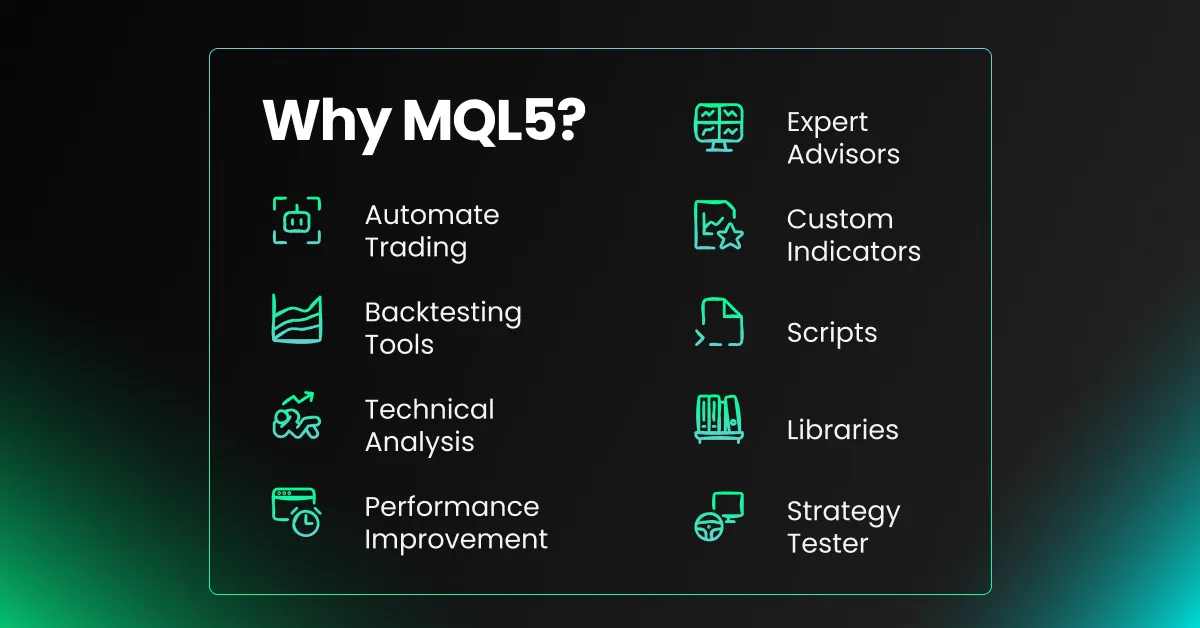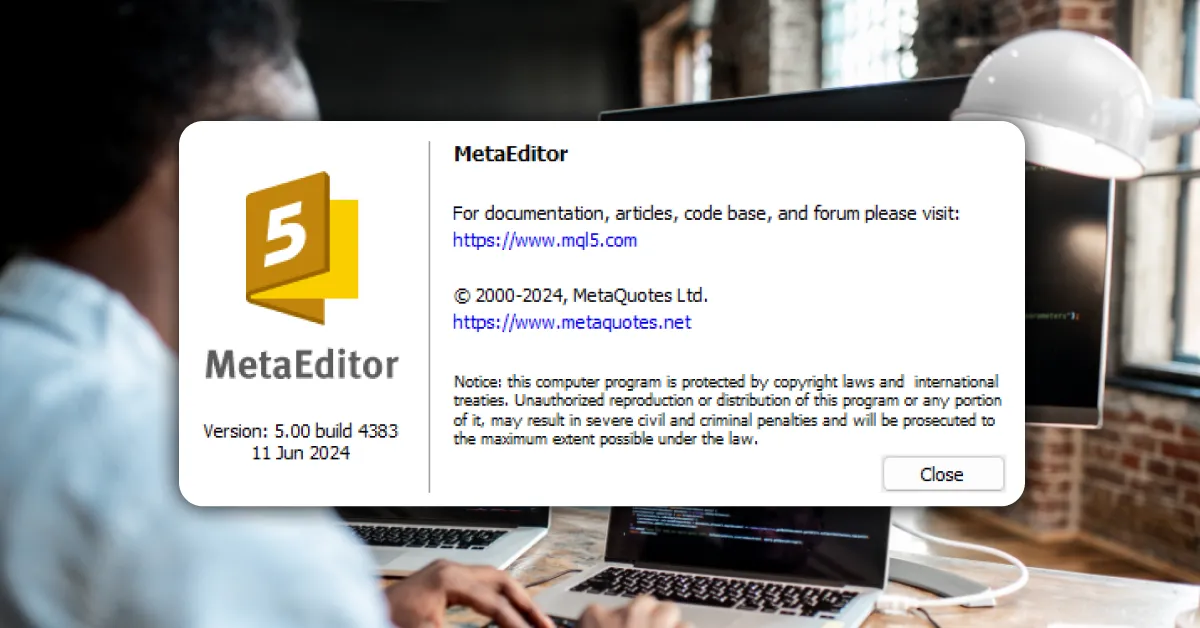What is MQL5?
MQL5 (MetaQuotes Language 5) is a high-level programming language designed for developing trading robots, scripts, and technical indicators within the MetaTrader 5 (MT5) platform. It allows traders to automate their strategies, backtest their ideas, and enhance their technical analysis capabilities.
MQL5 is widely used for algorithmic trading, enabling traders to create Expert Advisors (EAs) that can execute trades automatically based on predefined conditions. Unlike its predecessor, MQL4, MQL5 is more efficient, featuring a more advanced object-oriented approach, which improves coding flexibility and execution speed.
Why Use MQL5?
1. Automate Your Trading
With MQL5, traders can eliminate manual execution errors and automate strategies, ensuring consistency in trade execution without emotional interference.
2. Advanced Backtesting and Optimization
MQL5 provides a multi-threaded strategy tester, which allows traders to backtest their trading strategies on historical data and optimize their parameters for better performance.
3. Enhanced Technical Analysis Tools
The language allows traders to create custom technical indicators that go beyond the default set available in MetaTrader 5, enabling deeper market analysis.
4. Improved Performance Over MQL4
MQL5 introduces object-oriented programming (OOP), making it easier to write cleaner, reusable, and scalable code compared to MQL4.
MQL5 Key Features
1. Expert Advisors (EAs)
Expert Advisors are automated trading bots that execute trades based on predefined algorithms. Traders can set up an EA to enter and exit trades according to specific conditions, eliminating the need for manual trading.
2. Custom Indicators
MQL5 allows traders to develop custom indicators beyond what is available on MT5. These indicators help in identifying trends, momentum shifts, and price patterns.
3. Scripts
Scripts are one-time execution programs that perform tasks such as opening or closing multiple trades, modifying stop-loss levels, or collecting market data.
4. Libraries and Include Files
MQL5 supports the creation of libraries and include files, which help developers reuse code across multiple programs, reducing redundancy and improving efficiency.
5. Strategy Tester
The MQL5 Strategy Tester allows traders to simulate their trading strategies on past data, helping them evaluate performance before deploying strategies in live markets.
Getting Started with MQL5
1. Setting Up MetaEditor
To start coding in MQL5, traders need to use MetaEditor, the built-in coding environment of MetaTrader 5. It provides debugging tools, auto-complete features, and an integrated compiler to help traders write and test their code efficiently.
2. Basic MQL5 Syntax
MQL5 is similar to C++ and follows an object-oriented approach. Here’s a simple example of an EA structure in MQL5:
3. Writing a Simple Trading Bot
A simple trading bot can be created by defining conditions for trade entries and exits using if-else conditions and market indicators.
4. Debugging and Compiling Code
MetaEditor provides built-in debugging tools that help identify errors before deploying scripts on the MT5 platform.
Advanced MQL5 Programming Concepts
1. Using Object-Oriented Programming (OOP)
MQL5 supports OOP, allowing traders to define classes and objects, which makes code modular and scalable.
2. Connecting to External APIs
Traders can integrate MQL5 with external APIs to fetch live data, execute trades on multiple platforms, or send trade signals to external systems.
3. Multi-Asset Trading Bots
MQL5 enables traders to develop bots that can trade multiple assets simultaneously, improving efficiency and portfolio diversification.
4. Machine Learning in MQL5
Some traders incorporate machine learning models into MQL5 algorithms by integrating external Python scripts using MetaTrader 5’s Python API.
Best Practices for MQL5 Development
1. Use Proper Risk Management: Implement stop-loss and take-profit mechanisms to protect capital.
2. Optimize Code for Speed: Ensure that the code is optimized for execution speed to prevent lags in volatile markets.
3. Backtest Before Deploying: Always test trading strategies on historical data before running them on live accounts.
4. Stay Updated: Keep learning about the latest MQL5 updates and improvements to stay ahead in algorithmic trading.
Conclusion: Why Learn MQL5?
MQL5 is an essential skill for traders looking to automate their strategies and gain an edge in the financial markets. Whether you want to build trading bots, custom indicators, or scripts, learning MQL5 can significantly improve your trading efficiency and decision-making.
For more educational resources, visit MQL5 Algo Trading community and start coding today!
Q&A Section:
1. What is MQL5 used for?
MQL5 (MetaQuotes Language 5) is used for developing trading robots (Expert Advisors), custom indicators, scripts, and automated trading systems within the MetaTrader 5 (MT5) platform. Traders use MQL5 to automate trading strategies, conduct advanced technical analysis, and backtest trading ideas using historical data. It allows for efficient execution of trades without human intervention, improving accuracy and consistency in trading.
2. Is MQL5 same as MT4?
No, MQL5 and MQL4 are different programming languages designed for MetaTrader 5 (MT5) and MetaTrader 4 (MT4), respectively. While both are used to create trading algorithms, MQL5 offers more advanced features, including object-oriented programming (OOP), multi-threaded strategy testing, and improved execution speed. Additionally, MQL5 allows for depth-of-market access, which is not available in MQL4. Due to these enhancements, MQL5 is considered more flexible and efficient for algorithmic trading.
3. Is MQL5 same as C++?
MQL5 is similar to C++ in its syntax and structure, but they are not the same language. MQL5 is specifically designed for trading applications, making it more streamlined for financial markets. While it supports object-oriented programming (OOP) like C++, it does not have all the capabilities of full-fledged programming languages such as memory management and system-level operations found in C++. However, experienced C++ programmers can easily adapt to MQL5 due to its similar coding style and logical structure.





